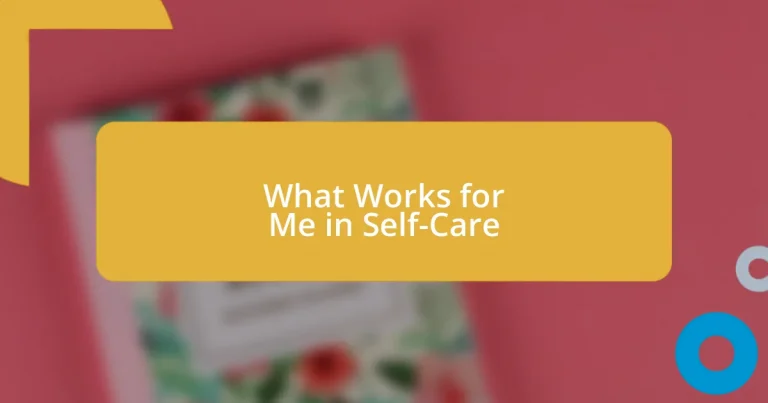Key takeaways:
- Self-care is essential for well-being; prioritizing it strengthens one’s ability to support others and enhances mental health.
- Identifying personal self-care needs through self-reflection and experimenting with various activities helps tailor practices to individual preferences.
- Creating and maintaining a flexible self-care routine allows for better management of physical and mental health amidst life’s demands.
- Utilizing support systems, including friends and professionals, provides valuable perspectives and emotional relief, enriching the self-care journey.
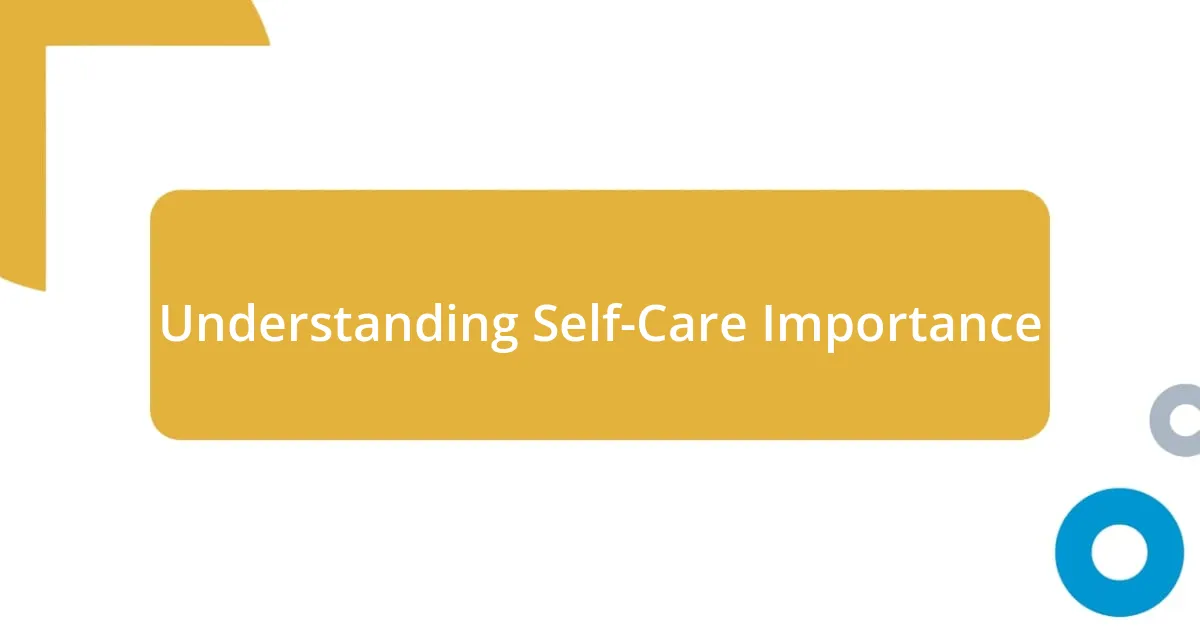
Understanding Self-Care Importance
Self-care is not merely a luxury; it’s a necessity that fuels my overall well-being. When I neglect my own needs, I quickly feel drained and overwhelmed. How often do we push ourselves to the brink, thinking we’re being productive, only to realize we’re actually doing ourselves a disservice?
For me, dedicating time each week to unwind has transformed my perspective on stress. I remember those days when I’d skip self-care because it felt selfish. Now, I see it differently: resting and nurturing myself strengthens my capacity to support others. Doesn’t it make sense that we can’t pour from an empty cup?
Understanding self-care’s importance also means recognizing its ripple effects. I’ve noticed that when I prioritize my own mental health, I’m much more present and engaged with my loved ones. It makes me wonder, if we all took our self-care seriously, how much more connected and fulfilled could we be?
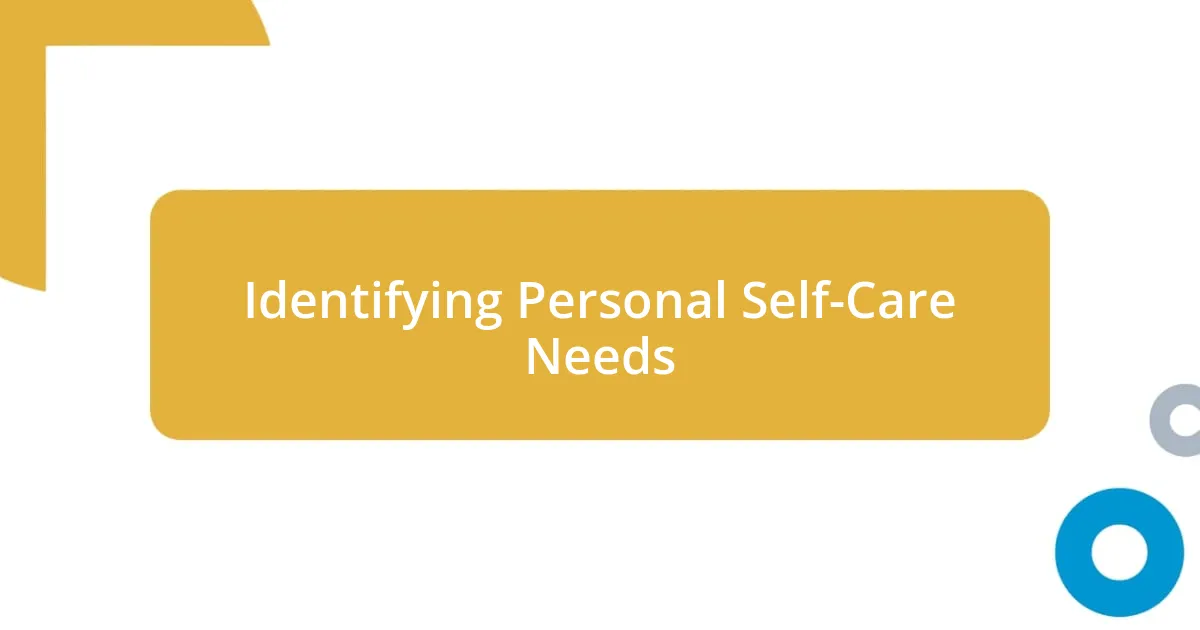
Identifying Personal Self-Care Needs
Identifying your personal self-care needs is like uncovering a treasure map. I’ve learned that taking time for self-reflection is crucial. When I sit quietly and ask myself what I truly need—whether it’s time alone, a workout, or indulging in my favorite book—the answers often surprise me. I’ve found journaling about my feelings can clarify what self-care steps I should take. It’s incredible how tuning into my emotions reveals specific needs I hadn’t recognized before.
In my experience, experimenting with various self-care activities has been eye-opening. Initially, I thought a spa day was the ultimate self-care remedy, but I discovered that simple acts like brewing a cup of herbal tea or enjoying a walk in nature can recharge my spirit more effectively. By tracking how I feel before and after different activities, I can pinpoint what truly rejuvenates me. Over time, I’ve realized that my self-care needs evolve, requiring me to stay attuned to my changing emotions, energy levels, and circumstances.
Often, we overlook the significance of our unique preferences. I’ve seen friends who thrive on social interaction while others recharge through solitude. Understanding these distinctions is vital. How can one size ever fit all in self-care? I recommend creating a personal self-care checklist. This simple exercise allows me to visualize the activities that nourish my spirit, helping me prioritize them in my daily routine.
| Self-Care Activity | Personal Impact |
|---|---|
| Journaling | Clarifies emotions and identifies needs |
| Daily Walks | Boosts mood and physical energy |
| Reading | Escapes into different worlds, reduces stress |
| Tea Time | Relaxation ritual, promotes mindfulness |
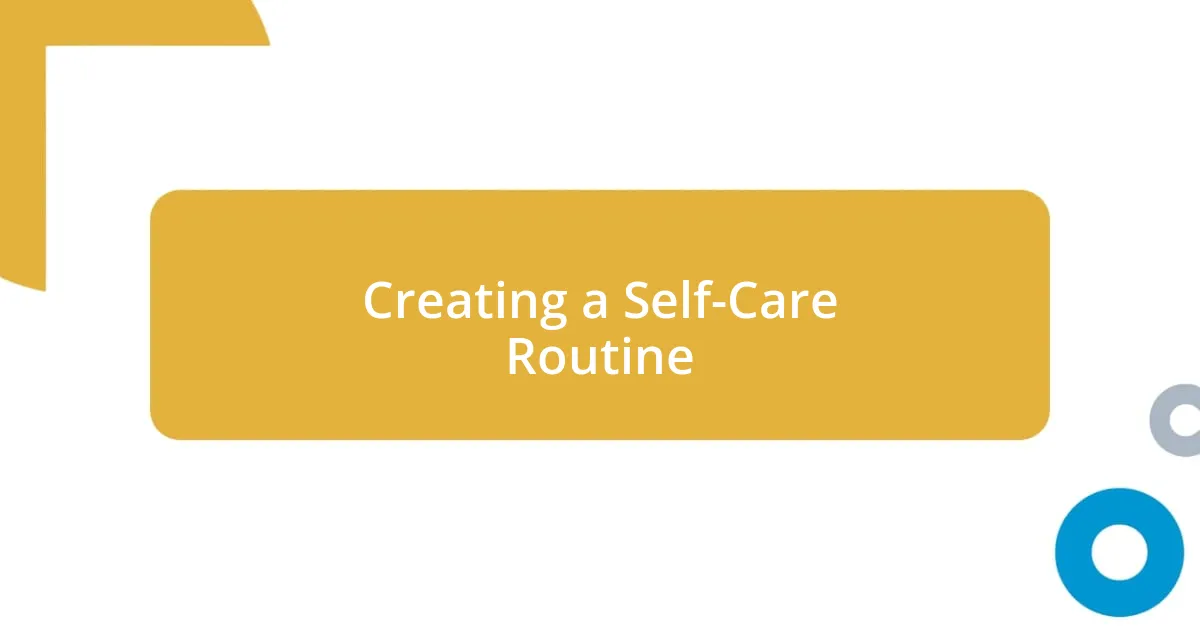
Creating a Self-Care Routine
Creating a self-care routine is essential for sustaining my well-being, yet it can feel daunting when life gets busy. I remember the times I juggled multiple responsibilities and neglected my self-care—each time, I paid the price in increased stress and irritability. Now, I make it a priority to carve out specific time slots for myself, creating a plan that I can actually stick to.
- Choose a consistent time for self-care activities, making them non-negotiable.
- Start small and gradually build a routine that feels manageable and enjoyable.
- Create a cozy environment that invites relaxation and mindfulness.
- Include a mix of physical, mental, and emotional self-care practices.
- Regularly reassess your routine to ensure it meets your evolving needs.
In my experience, flexibility is key. There have been weeks when I felt overwhelmed, and I had to adapt my self-care practices on the fly. I recently found that on particularly hectic days, simply giving myself permission to enjoy a few quiet moments with a favorite podcast provided a much-needed escape. By being open to adjusting my routine, I discovered self-care doesn’t have to mean a solo day retreat; it can simply be finding bliss in small moments scattered throughout my day.
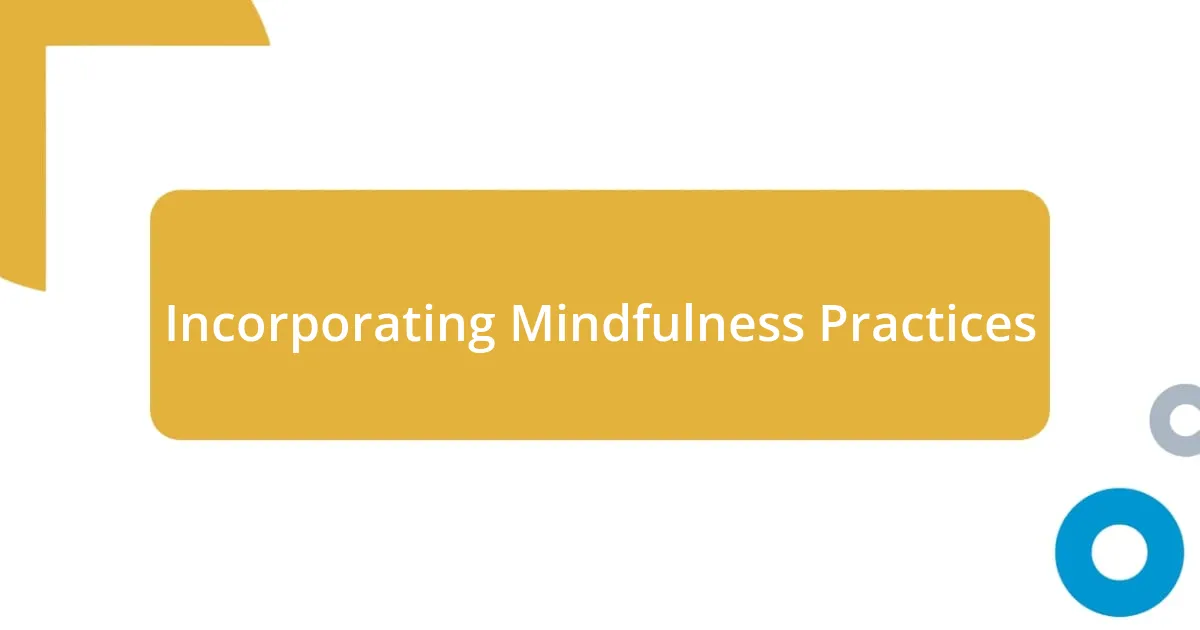
Incorporating Mindfulness Practices
Incorporating mindfulness practices into my daily life has been transformative. I still remember the first time I tried a mindful breathing exercise; it felt like hitting a pause button on the chaos of my day. Focusing on my breath for just a few minutes helped clear the mental clutter swirling around in my head. Have you ever noticed how quickly our thoughts can spiral? When I refocus on my breathing, it’s like a reset for my mind.
Mindfulness isn’t just about meditation—it’s about being present in every moment. I often practice mindfulness while I wash the dishes. Instead of letting my thoughts drift to an endless to-do list, I concentrate on the sensation of the warm water and the smooth texture of the plates. This might seem trivial, but those few moments of intentional awareness can shift my entire mood. I wonder how many small moments we miss just because we’re not fully present.
Over time, I’ve discovered that incorporating mindfulness into mundane tasks makes them feel more fulfilling. For instance, while taking a walk, I try to engage my senses purposely—what do I hear around me? What scents linger in the air? I’ve had sudden realizations during these walks, often feeling a wave of gratitude wash over me for the simple beauty of life. It’s about training the mind to savor rather than rush. And honestly, who wouldn’t want to feel a deeper connection to the world around them?
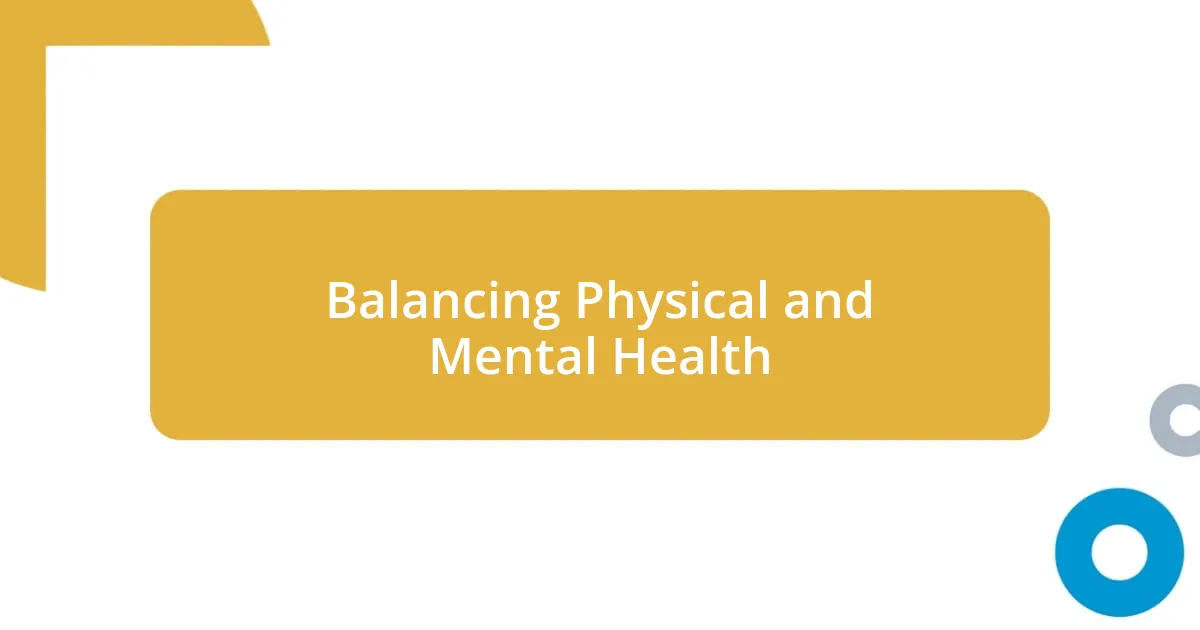
Balancing Physical and Mental Health
Finding the right balance between physical and mental health has been a game-changer for me. I used to focus primarily on my physical fitness, believing that hitting the gym was the answer to my well-being. But then I realized that without addressing my mental state, my physical efforts felt hollow. Have you ever pushed yourself to run a mile only to feel mentally drained afterward? I know that feeling all too well.
I often remind myself that physical activity doesn’t just mean sweating it out in a gym; it can also include outdoor activities that rejuvenate my mind. One of my favorite ways to balance both aspects is through hiking. The rush of climbing a hill warms my body, but the beauty of nature clears my head. Each time I reach a viewpoint, I find peace in the moment, deepening my appreciation for both my physical capabilities and my mental clarity. Do you have a go-to activity that combines both?
Moreover, I’ve learned that incorporating rest days is crucial. Initially, I felt guilty for taking time off from my workouts, but those days of relaxation have proven vital for my mental health. It’s like giving my brain the space to breathe while my body recharges. One evening spent with a good book instead of a workout can shift my entire week’s perspective. Isn’t it interesting how a moment of stillness can unravel so much tension and refocus our paths?
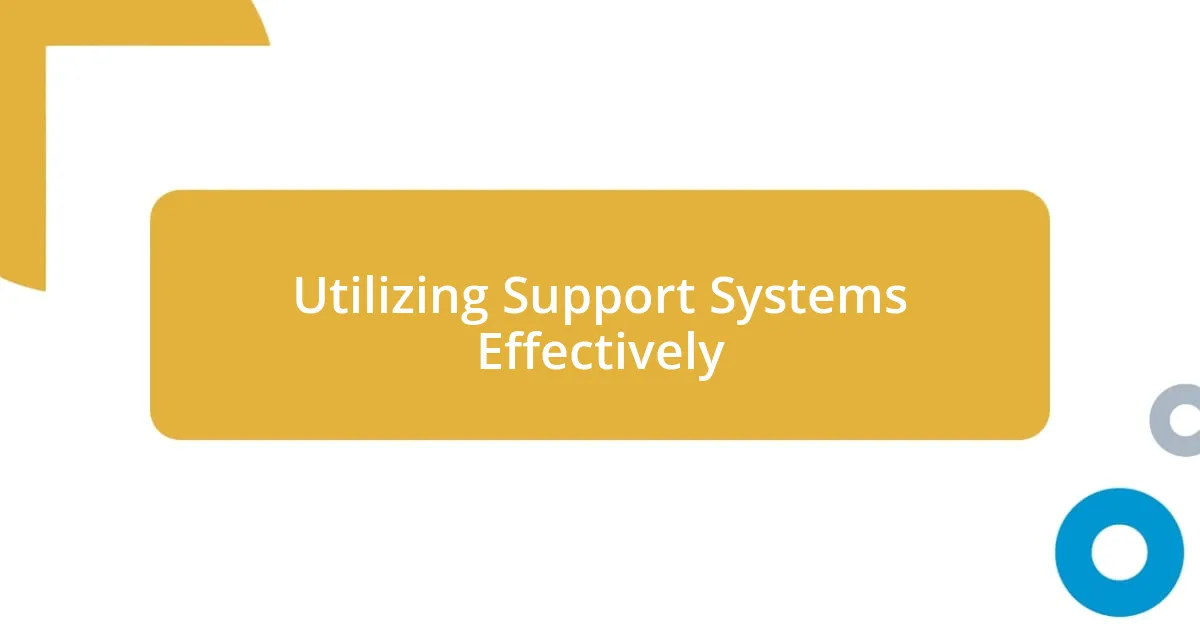
Utilizing Support Systems Effectively
Utilizing a support system effectively has been a key element in my self-care journey. I often find that just talking things through with a friend can illuminate perspectives I hadn’t considered. There’s something comforting about sharing burdens with someone who understands. Have you ever felt a weight lift after confiding in someone close? It’s a feeling I cherish, knowing I don’t have to navigate my challenges alone.
In trying to strengthen my support network, I make a conscious effort to check in with my loved ones regularly, too. I remember a particularly overwhelming week at work when I reached out to a dear friend over coffee. That simple act of connection opened up a conversation that not only relieved my stress but also allowed me to lend an ear to her concerns. It’s a beautiful exchange that reminds me of the importance of reciprocity in relationships. How often do we think to offer support when we need it ourselves?
Furthermore, I’ve learned the invaluable role of seeking professional help when needed. Therapy has become a refuge for me, providing a safe space to unravel emotions that I sometimes can’t articulate elsewhere. It’s like having a personal trainer for my mental well-being. Those sessions help me recognize patterns in my thoughts that I might miss on my own. Have you considered how such professional support could influence your emotional landscape? For me, it’s not just about managing problems—it’s about deepening my understanding of myself.
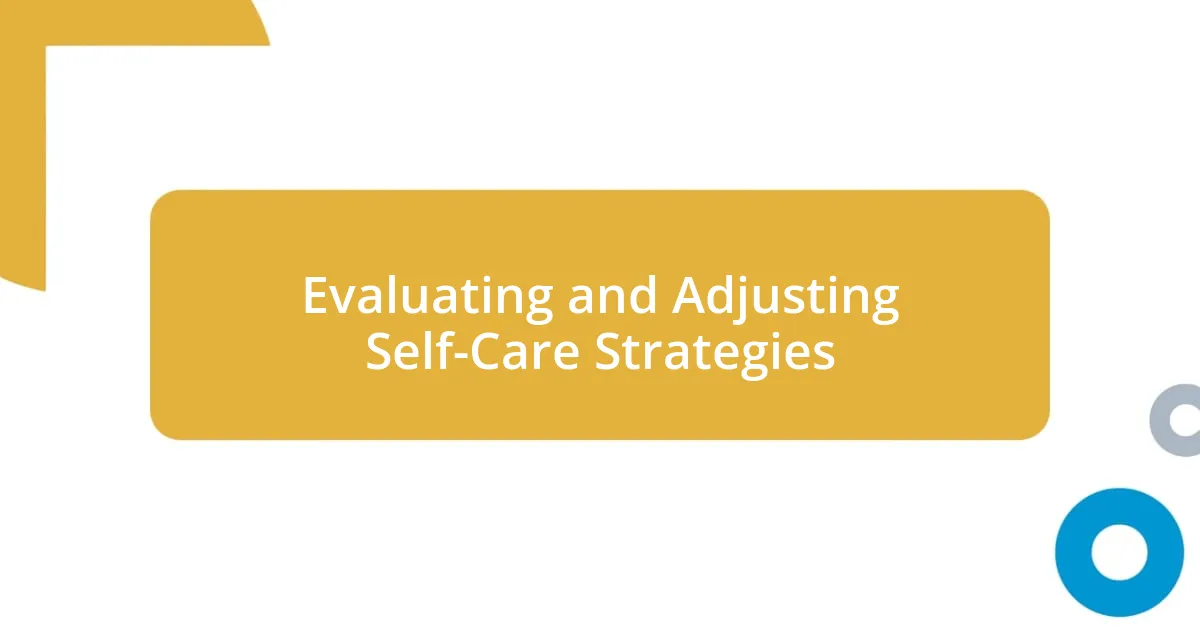
Evaluating and Adjusting Self-Care Strategies
Evaluating self-care strategies is a continual process that I’ve come to embrace wholeheartedly. I remember a time when I thought a nightly skincare routine was my sacred self-care moment. But after several months, I realized that while my skin improved, I wasn’t feeling mentally refreshed. Have you ever felt that disconnect between what you’re doing and how you’re feeling? It prompted me to take a step back and assess what truly nourished my spirit.
Through self-reflection, I discovered the importance of flexibility. Instead of sticking rigidly to a fixed routine, I began to vary my self-care activities based on my mood and energy levels. One day, I might indulge in a calming bath with a podcast, while the next day, I burst with creativity and dive into art therapy. This adaptability has allowed me to tune in to my needs better. Have you noticed how your preferences shift over time? Recognizing those shifts can lead to a more fulfilling self-care experience.
Feedback is another powerful tool in this evaluative process. After trying out different strategies, I’ve created a habit of journaling my experiences, which helps me articulate what works for me and what doesn’t. Recently, I jotted down how a particular meditation app influenced my stress levels. Looking back, I was surprised at how much it helped me declutter my thoughts on particularly chaotic days. Isn’t it fascinating how writing can crystalize our thoughts and feelings? By documenting my journey, I can celebrate successes, acknowledge setbacks, and continually refine my self-care practices.












